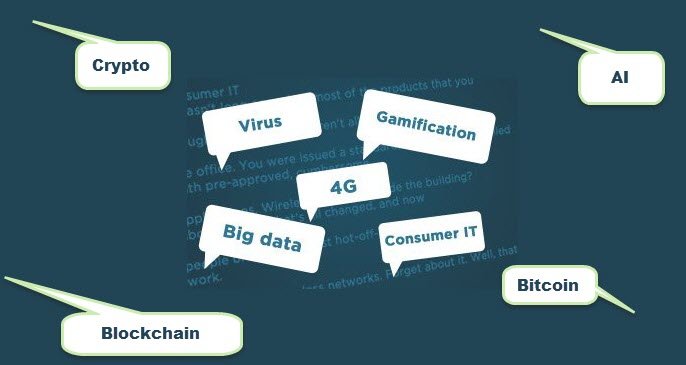Every field has its own set of acronyms and buzzwords that are frequently used. Some buzzwords are easy to understand given the context, while others require an online search to understand.
The definition of buzzwords according to the Free Dictionary is: “a word or phrase, often sounding authoritative or technical, that has come into vogue in popular culture or a particular profession“. In this post, we will check out some of the important and popular buzzwords in the IT sector.
Computer, IT, or Tech Buzzwords

You may be surprised to know that there is a system that releases the most used buzzwords, slang, etc., annually. The system is called Global Language Monitor or GLM for short. According to the GLM, the usage of acronyms and buzzwords is not only fashionable but also serves English as it says much more in one or more word(s). It keeps an eye on what all is being published on the Internet and how many times a word, acronym or phrase is repeated to find out new buzzwords and acronyms.
Top IT Buzzwords That Confuse Many
Big Data
It’s the biggest buzzword these days. Before that, no one knew the term existed, but thanks to AdSense and advertisers, Big Data is a common buzzword that is not quite easy to understand. In effect, Big Data refers to one or more data sets that can be used to create strategies after analyzing them. Big Data is not one or two MB. It can be measured in terms much higher than Gigabytes, such as hundreds of terabytes! There are special tools to analyze such data; humans cannot analyze it without error margins and, more importantly, bias.
Read: What is Cryptocurrency?
Cloud
This makes sense and, at the same time, keeps us confused. Anything not on your premises and implemented on remote servers is in the cloud. That is not a comprehensive definition as there are other factors related to it. Many people do not understand the entire concept of the cloud. Some think it is only for storage, while others know about the features of the cloud they use. I remember watching an interview with a politician. The politician said, “Google stores email in the cloud CD. But the data is lost if you cannot retrieve the mail before it rains!” I wonder if this has to do anything with philosophy or the politician was really that ignorant. So then…What is Cloud?
AI
Artificial intelligence (AI) enables computers and machines to simulate human intelligence and problem-solving capabilities. It allows them to perform tasks that would otherwise require human intervention. These systems learn from vast amounts of data. They can identify patterns, enabling them to carry out tasks like having human-like conversations, problem-solving, coding, predicting online shopping preferences, and so on.
LLM
Large Language Models (LLMs) are computational models notable for their ability to achieve general-purpose language generation and other natural language processing tasks. These models process vast amounts of text data to produce human-like responses to natural language queries.
Machine Learning
Machine learning (ML) is a subfield of artificial intelligence (AI) that leverages algorithms trained on data sets to create models. These models enable machines to perform tasks that would otherwise only be possible for humans.
The Next Big Thing
It is an easy buzz, understood by all. This need not be explained. But it has been used in so many contexts that we truly do not know the next big thing. Err… Can it be Ubuntu convertible smartphone? I guess it varies from person to person.
Read: What is Bitcoin?
Social Discovery
This one is a little tough to understand, even though the words indicate that it is some discovery via social networking sites. For example, you learn about anything using social network sites, it is social discovery. It covers blogs, reviews, and views not limited to social sites.
Read: What is Blockchain?
CERN
It is very confusing indeed, as the acronym does not even match what it represents. According to Wikipedia, “The European Organization for Nuclear Research, known as CERN, is a European research organization whose purpose is to operate the world’s largest particle physics laboratory.”
Read: What is the Internet of Things?
Web 3.0
It used to indicate a better world wide web. From what I understand, Web 2.0 is way ahead of static pages, where users had to interact in passive mode. Web 3.0 is faster and lets the user interact in real time. It has features to engage users for a long time, such as social networking sites.
Read: What is Net Neutrality?
2G, 3G, 4G, 5G
Here, G stands for generation, and the entire work 2G-5G refers to mobile bandwidths. There are differences when it comes to speed while using or flipping among the generations. A 4G is higher (faster), but the network may not be available everywhere. In that case, your phone will drain more battery looking for the 4G network. As of now, 5G is even rare, and I don’t think you should keep it “ON” in areas where you know it won’t be available – such as rural areas.
Read: What is Artificial Intelligence& Machine Learning?
SoLoMo
This is another confusing but popular/important IT buzzword. It stands for the convergence of Social, Local, and Mobile. Even after reading an entire blog on it, I still can’t create a proper image of it in my brain. This needs more research.
Read: What is Quantum Computing?
SOA
One of the most confusing but important IT buzzwords is SOA. There are more than 40,000 books on the topic, each trying to explain Solutions Oriented Architecture.
In case you think I missed out on any popular IT buzzword, please share with us.
Leave a Reply